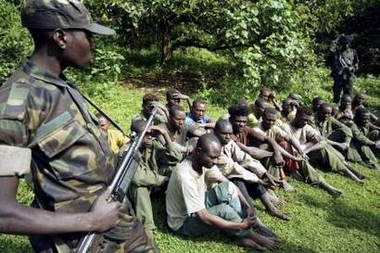By James Munyaneza
13/11/07
 KIGALI – A new era is starting. This is what Foreign Affaires Minister Dr Charles Murigande announced yesterday when asked about DR Congo’s declared commitment to disarm ex-FAR/Interahamwe.
KIGALI – A new era is starting. This is what Foreign Affaires Minister Dr Charles Murigande announced yesterday when asked about DR Congo’s declared commitment to disarm ex-FAR/Interahamwe.
Addressing a press conference yesterday on the Friday Nairobi pact between the two countries, Murigande said Kinshasa now considers FDLR – which is an amalgamation of ex-FAR and Interahamwe militia – as a Genocide group.
“In the (Nairobi) meeting I witnessed a change in attitude and language on the part of Congolese officials.
There seem to be a new resolve to deal with the FDLR problem,” Murigande said at the Foreign Affairs ministry headquarters in Nyarugenge, Kigali.
The minister was briefing journalists on an agreement he signed on Friday together with his Congolese counterpart, Antipas Mbusa Nyamwisi, in which DRC committed itself to disarm and repatriate FDLR rebels.
The agreement, which was facilitated by the UN and witnessed by the US and the European Union, provides for Kinshasa to arrest and hand over to Rwanda and the International Criminal Tribunal for Rwanda (ICTR) suspects of the 1994 Rwanda Genocide, several of whom are members of the FDLR.
If implemented, observers say, the agreement will go a long way in stabilising the Great Lakes Region, which has suffered a genocide and subsequent conflicts that led to the death of at least four million people since 1994.
The FDLR has been at the heart of diplomatic hitches between Rwanda and DRC for as many years.
“FDLR is a regional problem which does not only destabilise Rwanda and DRC but also the rest of the region. They have been crossing over to the Burundi border to support Palpehutu FNL (rebels),” Murigande said.
Asked whether he thought DRC has the muscle to dislodge the Rwandan militias, Murigande said: “They (DRC) said that with the support of MONUC (UN Mission in Congo), they will disarm them.
There are around 40,000 Congolese soldiers in eastern DRC on top of about 8,000 MONUC peacekeepers in that region.
And with FDLR numbering between 6,000 and 10,000, the ratio would be one FDLR rebel fighting around five soldiers.”
Murigande also expressed optimism that Congo will rein in its military officers accused of collaborating with FDLR.
“Now that the Government of DRC says that it is ready to confront militarily the FDLR, it would be logical that all measures will be taken to prevent elements of Congolese army from collaborating with FDLR, which has now been declared an enemy force that they are going to fight.
“A new era is starting in which DRC will not tolerate any of its officers to work with a force declared as enemy of the state,” Murigande said.
He said that the sudden shift in Kinshasa’s policy on FDLR came probably out of the realisation that the group had continuously perpetrated human rights abuses against Congolese civilians.
“One time when I was in DRC, a Congolese official told me that what FLDR are doing show that they are not humans… that they pound babies like groundnuts, rape and mutilate women with all sorts of crude materials.
That official was one of President (Joseph) Kabila’s advisors,” he recalled.
Commenting on the resolution that FDLR members that face no Genocide charges and do not want to return to Rwanda, would be relocated to distant DRC areas, Dr Murigande said:
“The general understanding is that the majority of the rank and file of ex-FAR/Interahamwe (FDLR) want to be repatriated, and if they are not doing so now, its because of the grip of genocidal commanders.
“But many have brothers, sisters and parents who are peacefully settled in Rwanda, and would want to join them.”
“However, because of the bad propaganda that they have been taught by their genocidal leaders, some might be hesitant to return.
That is why we agreed that those ones will temporarily be relocated to areas far from Rwanda, and later on, we embark on a sensitisation campaign for their voluntary repatriation,” he added.
Murigande also said that Kigali would use information gathered from Gacaca courts to determine Genocide suspects that are not in the country and send their names to Kinshasa, which the latter would use to identify Genocide suspects that could be at large on its territory.
“We know those that are in category I (Genocide suspects), but certainly not all those that committed Genocide are known now,” he said while acknowledging that not all fugitives might be identified immediately especially since some of them acquired Congolese names.
“What is important now is to address the security threat that they (FDLR) represent.
If they are disarmed and are not threatening the security of Rwanda, DRC and the region, the rest will be sorted out with time,” he said.
Under the Nairobi agreement, Congo committed itself to draw a detailed plan to disarm FDLR and share it with the Rwandan government by December 1.
The Nairobi ministerial meeting and subsequent agreement came after Rwanda reacted to DRC’s plan to disarm FDLR, which Kigali said was lacking, and provided a counter-proposal.
There have previously been a series of agreements between the two countries on FDLR disarmament and repatriation, but little was registered under those arrangements.
The New Times
